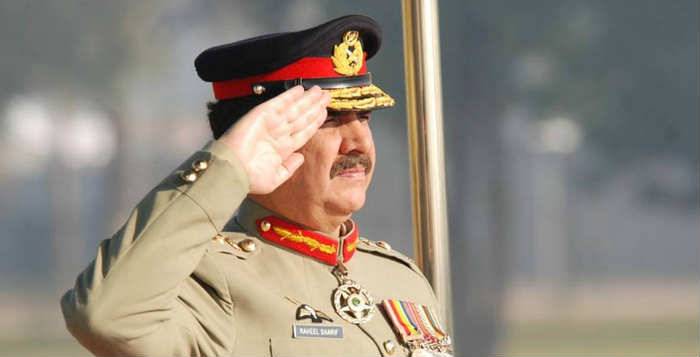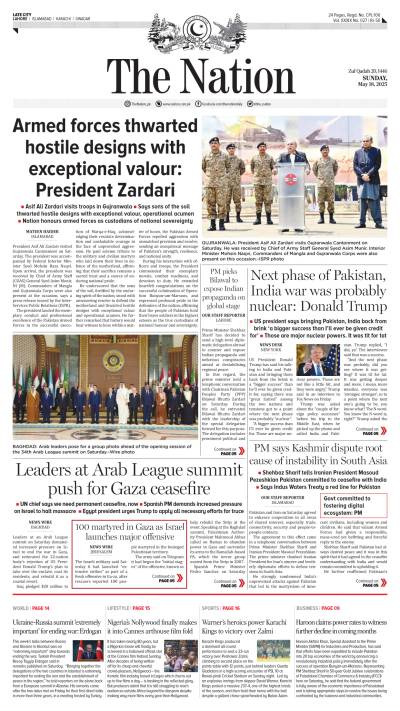Pakistan Army Chief General Raheel Sharif merely saying that he would retire on his due date is a justifiable cause for celebration in the country. It’s believed to be the biggest triumph for democracy since August 31, 2014 when the Army Chief generously decided in the corps commanders’ meeting not to bring down the guillotine that had been raised through the joint PTI-PAT expeditions in the capital. Since decapitating democracy no longer had the backing of US, or China, judicious as always the establishment settled for amputation by reaffirming control over the foreign policy.
The 17 months between the two democratic triumphs have witnessed an enthusiastic PR campaign for General Sharif’s promotion as the saviour of Pakistan. This span witnessed a plunge in terror attacks to their lowest in a decade, as Operation Zarb-e-Azb – General Sharif’s baby – initiated the cleansing of the northwest. These 17 months also gave us the APS and BKU attacks, reconfirming young students’ participation in Zarb-e-Azb as valiant martyrs.
“I don’t believe in extensions and will retire on due date,” Sharif said via DG ISPR Lt Gen Asim Bajwa at 1:19 PM local time on January 25, adding that the fight against “terrorism will continue with full vigor and resolve.” The announcement on Twitter came five days after the Bacha Khan University attack in Charsadda, in which 21 students and staff members were killed.
During these five days the Army had to deal with an unfamiliar foe: castigation and cynicism, directed openly and venomously by the local opinion makers. Despite an angry presser conducted by Lt General Bajwa on January 23, the critique kept piling on.
How successful Operation Zarb-e-Azb really is, when both APS and BKU attacks were orchestrated parallel to it, the establishment was asked. When the Army possesses the de facto policy-making authority on the two fronts relevant to countering terrorism – security and diplomacy – why is the establishment trying to shy away from accountability, it was discussed.
Lt General Bajwa then shamed the critics on January 25. In the Twitter announcement that said that the Army Chief “does not believe in extension”, General Raheel was put on the pedestal by the DG ISPR. The unsaid message was delivered to the cynics.
To address the inevitable question over the captain abandoning a stuttering – or as pessimists believe a sinking – ship, Lt Gen Bajwa tweeted that “Pakistan’s national interest is supreme and will be safe guarded at all costs.” The national interests obviously include the critics turning the volume low on scepticism vis-à-vis the state’s security policies and unnecessary questions over accountability. Taking cue, the intelligentsia shifted the narrative from outrage over schools being under attack to the good general safeguarding democracy yet again. Those who religiously avoided the #ThankYouRaheelSharif bandwagon were duly thanking General Raheel Sharif.
Meanwhile, some form of terror continued to jar Balochistan and Khyber Pakhtunkhwa – from attacks on polio offices to blasts in markets and bus stops. And as parents mulled whether or not it’s suicidal to send their kids to school, the top level national discourse was dedicated to General Raheel’s services in readjusting the civil-military balance.
The general consensus was that an Army chief retiring on time, and not implementing martial law, is all that democracy needs in Pakistan. Questions over the ingredients for a coup still being present, owing to policymaking imbalance between state institutions, were adjudged to be superfluous. Maybe they were against national interest.
With national interests safeguarded and unity ensured, General Raheel Sharif and his media troops returned to devising plans to break the enemy’s backbone in Afghanistan. Calls have been made to President Ashraf Ghani, recordings have been dug out of the perpetrators of the BKU attack and facilitators have been killed or captured.
With the monkey off its back, the establishment can now go back to installing the Afghan Taliban in Kabul, through the multilateral peace negotiations. General Sharif’s dedication to successful talks between Kabul and Taliban, over the past couple of years, has been second only to his zealous leadership of Operation Zarb-e-Azb. By accommodating the Taliban in Kabul, the Pakistani establishment would safeguard democracy in the neighbourhood as well.
Even though the cynics have been diverted towards other matters, they would soon have to be convinced that fixing Afghanistan is the logical way to go about things when you’re trying to fix Pakistan. Those too ignorant to gauge New Delhi’s intent of flanking Pakistan, and unaware of India exacerbating militancy through the west, should really be silenced by the Afghan recordings. Mentions of Pathankot attack, United Jihad Council’s (UJC) well guarded press conference in Muzaffarabad or relations with India should be contrary to national interest, if not downright treasonous.
The establishment’s plan is simple: accommodate Taliban in Kabul to parry away Indian influence and in turn curb terrorism in Pakistan. The anti-establishment conspiracy theorists would be told that this counter-terrorism policy is the mid-90s brainchild of democracy's poster child Benazir Bhutto, and her interior minister Naseerullah Babar. Shielding Hafiz Saeed, Zaki-ur-Rehman Lakhvi and Azhar Masood is obviously a part of the bigger picture to secure Pakistan.
But what good would this illusion of peace be when the peacemaker himself waves goodbye in 10 months’ time? Would that not create paranoia and insecurity among the masses? No one wants temporary peace.
Petitions are being filed in the Supreme Court asking for General Raheel Sharif’s extension. An image is being shared on social media depicting an old man carrying a placard that reads: ‘I’ll set myself on fire if Raheel Sharif isn’t given an extension’.
The good general wouldn’t want to leave behind a terrorist-free Pakistan, where people are setting themselves on fire. Would he?






